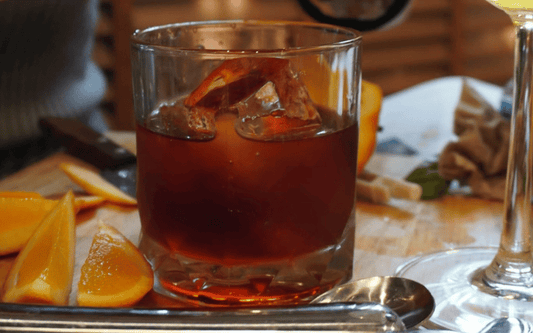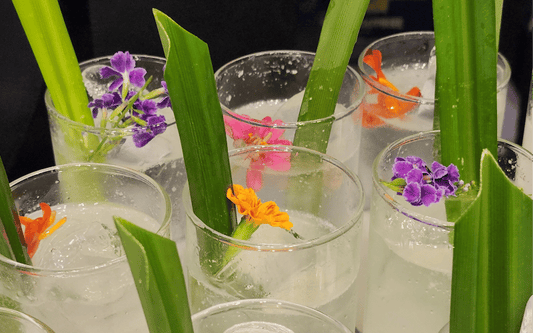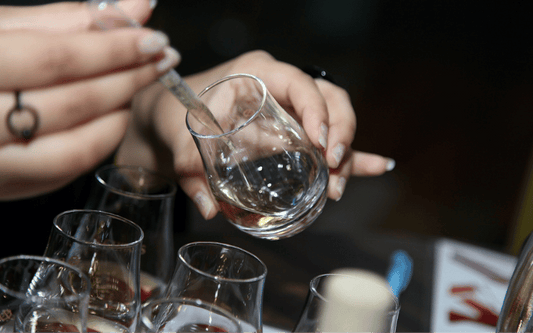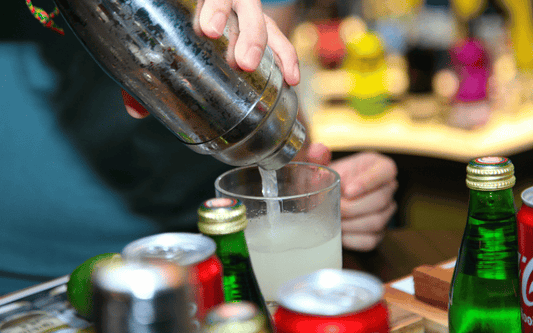เตกีล่า

เตกีลาเป็นสุรากลั่นที่มีเอกลักษณ์เฉพาะตัว มีต้นกำเนิดจากภูมิภาครอบเมืองเตกีลาในเม็กซิโก ผลิตจากต้นอะกาเวสีน้ำเงิน (Agave tequilana Weber var. azul) และมีชื่อเสียงในด้านมรดกทางวัฒนธรรมอันล้ำค่าและกระบวนการผลิตที่ซับซ้อน
ประวัติและต้นกำเนิด
ประวัติศาสตร์ของเตกีลาย้อนกลับไปถึงยุคโบราณ เมื่อชนพื้นเมืองของเม็กซิโกหมักน้ำเลี้ยงจากต้นอากาเวเพื่อใช้ในพิธีกรรมและการแพทย์ ชาวสเปนได้นำเทคนิคการกลั่นเข้ามาในภูมิภาคนี้ในศตวรรษที่ 16 ซึ่งเป็นการวางรากฐานสำหรับการผลิตเตกีลาสมัยใหม่
กระบวนการผลิต
-
การเก็บเกี่ยวอะกาเว่: เตกีล่าต้องผลิตจากอะกาเว่สีน้ำเงินอย่างน้อย 51% ต้นอะกาเว่จะใช้เวลาประมาณ 8-12 ปีจึงจะโตเต็มที่ก่อนเก็บเกี่ยว
-
การปรุงอาหาร: หัวใจของต้นอากาเว่ที่เรียกว่าปิญาส จะถูกเก็บเกี่ยวและนำไปปรุงในเตาอบ (ฮอร์นอส) หรือหม้ออัดไอน้ำเพื่อเปลี่ยนแป้งให้เป็นน้ำตาลที่สามารถหมักได้
-
การสี: เมล็ดอากาเว่ที่ปรุงสุกแล้วจะถูกบดเพื่อคั้นน้ำ เดิมทีใช้เครื่องบดหินภูเขาไฟที่เรียกว่าทาโฮนา แต่วิธีการสมัยใหม่ก็ใช้เครื่องบดแบบกลไกด้วย
-
การหมัก: น้ำผลไม้ที่สกัดได้จะถูกหมักในถัง ซึ่งโดยทั่วไปทำจากไม้หรือสแตนเลส โดยมีการเติมยีสต์เพื่อเปลี่ยนน้ำตาลให้เป็นแอลกอฮอล์
-
การกลั่น: เตกีลาผ่านการกลั่นสองครั้งในหม้อต้ม (alambique) เพื่อทำให้ปริมาณแอลกอฮอล์บริสุทธิ์และเข้มข้นขึ้น กระบวนการนี้ช่วยกลั่นรสชาติและกลิ่นของสุราให้บริสุทธิ์ยิ่งขึ้น
-
การบ่ม (ทางเลือก): ขึ้นอยู่กับประเภทของเตกีลาที่ผลิต อาจมีการบ่มในถังไม้โอ๊คเพื่อพัฒนารสชาติและสีเพิ่มเติม
ประเภทของเตกีล่าแบบเก่า ได้แก่:
Blanco (Silver/Plata): ไม่ได้บ่มและบรรจุขวดในเวลาไม่นานหลังจากการกลั่น
Reposado: บ่มในถังไม้โอ๊คเป็นเวลาขั้นต่ำสองเดือน
Añejo: บ่มในถังไม้โอ๊คเป็นเวลาอย่างน้อยหนึ่งปี
Extra Añejo: บ่มอย่างน้อยสามปี ทำให้ได้รสชาติที่เข้มข้นและซับซ้อน
การเลือกเตกีล่า
เครื่องหมายคุณภาพ: มองหาเครื่องหมาย "100% Agave" บนฉลาก ซึ่งระบุว่าเป็นเตกีลาที่ทำจากน้ำตาลจากต้นอากาเว่เท่านั้นโดยไม่ใช้สารเติมแต่ง
ประเภทและการบ่ม: เลือกตามความชอบส่วนบุคคลสำหรับรสชาติและความเข้มข้นของรสชาติที่ต้องการซึ่งได้รับอิทธิพลจากการบ่ม
ค็อกเทล
เตกีลาเป็นเครื่องดื่มที่มีประโยชน์หลากหลาย และยังเป็นส่วนผสมพื้นฐานของค็อกเทลยอดนิยมมากมาย เช่น:
มาร์การิต้า: เครื่องดื่มผสมคลาสสิกที่ประกอบด้วยเตกีล่า น้ำมะนาว และทริปเปิลเซค เสิร์ฟพร้อมขอบแก้วโรยเกลือ
Tequila Sunrise: ผสมผสานเตกีลาเข้ากับน้ำส้มและเกรนาดีน สร้างเอฟเฟกต์พระอาทิตย์ขึ้นแบบหลายชั้น
Paloma: เครื่องดื่มผสมที่สดชื่นของเตกีลา โซดาเกรปฟรุต และน้ำมะนาว มักตกแต่งด้วยมะนาวฝานเป็นแว่นเทกีล่าเพียวๆ หรือใส่น้ำแข็ง: ผู้ที่ชื่นชอบชื่นชอบเพราะได้ลิ้มรสชาติอันบริสุทธิ์ของมัน
รสชาติอันเป็นเอกลักษณ์ที่ได้มาจากต้นอากาเว่และความสำคัญทางวัฒนธรรมทำให้เตกีลาเป็นสุราที่ได้รับการยกย่องไปทั่วโลก ได้รับการยกย่องในด้านการแสดงออกที่หลากหลายและบทบาทในวัฒนธรรมค็อกเทลที่มีชีวิตชีวา




